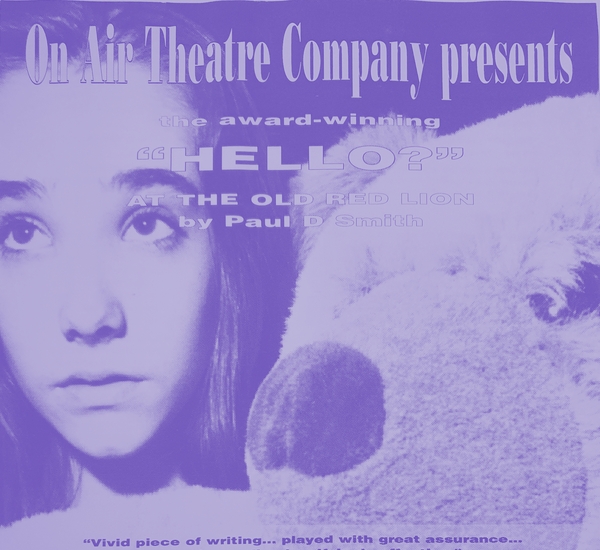‘Hello?’ is/was a terrific piece of original and dramatic writing and offered a very powerful and truthful dimension to the issue of sexual abuse and exploitation because it was written by a brilliant young dramatist and interpreted by Julie Smith a brilliant actress of the same generation. Both Paul Smith and Julie Smith (not related of course) had a professional attitude, creative intuition and maturity beyond their years to articulate what is still a taboo and uncomfortable subject, which our society is struggling to reconcile itself with.
What was so interesting about the experience was that fellow professionals of my generation (in terms of writing, acting and directing) could not believe that it could be produced effectively for stage theatre. But we did do it (as a collective creativity) and it clearly had a life beyond the intense and quite remarkable production and single performance at the Cambridge in London’s West End before an audience of about 1,000. Hence, the successful lunch-time theatre-run at the reknowned and respected writing theatre in Islington, London - The Old Red Lion.
The play did not need significant rewriting and if there were any changes to be made, they happened through the interaction of performers, director and writer during rehearsals. In the Woolwich Young Radio Playwrights project I never thought of the young writers selected for production as teenagers/students. Paul Dale Smith was treated as a professional dramatist whose presence was more than welcome and he supported the production team. He was the model of a professional writer. Always concentrating on what was happening; supportive of the director, direct and clear about what he wanted.
The purpose of the Woolwich scheme in terms of radio and theatre production was to give new writers the chance to participate in a professional collaborative environment and discover and appreciate the direction, quality and dimensions of their scripts. My feeling is that most writers can only ‘learn’ for themselves. ‘Teaching’ writing is primarily limited to techniques, devices, examples that work in specific contexts and examples that do not work in either the right or wrong contexts.
‘Hello?’ deserved production and performance elsewhere. Paul Dale Smith and many of the other writers deserved being taken up by professional agents. If my memory serves me correctly, I certainly did contact the regional theatre in Leicester and they certainly indicated a respect and interest in Paul’s work. I imagine they were unable to follow this up because they did not have a lunch-time production schedule. The lost opportunity in not being able to adopt Paul as a significant regional dramatist would have been another casualty of a trend that would also claim IRDP.
We all worked our hearts out and we had success in the circumstances then applying, but the sponsorship and arts funding IRDP raised needed matching pound for pound from the radio industry and it was not forthcoming. The wider context of professional theatre and literary agencies were deregulating themselves as much as independent radio was being deregulated. What I mean to say is that the ‘public service’ in the creative and cultural industries was being abandoned. And I am not talking about ‘subsidy’. I am talking about entrepreneurial investment in creative writers that can generate huge commercial, cultural and artistic benefits in both the short and long term.
I contacted literary agencies offering collaboration and inviting them to consider taking up the writers the IRDP schemes were discovering. When the economic conditions in UK independent radio became somewhat chilled, I also contacted the BBC offering our expertise, intelligence on new writers and opportunities for collaboration. The politest way of putting this is that our invitations were not taken up.
What Paul indicates in his blog is that as an individual writer there is a lesson to learn which is almost socially Darwinian. There can be no doubt or question about the possession and expression of significant talent and ability in creative writing and its potential in terms of a professional career. But for the potential to be achieved, tenacity, cunning, dogged, stubborn persistence, flexibility, incredible resources of emotional, intellectual and creative commitment and hard work, a necessary robust belief in oneself, and good luck are probably the least amount of factors that come into play.
And once you make the commitment and have been recognized as a professional writer, it never stops. You have the right to feel disappointed, to pause, to have a day job. I suppose the only existential antidote to everything that is not apparent success is: ‘I write; therefore I am. Now f*** off.’
Tim Crook
